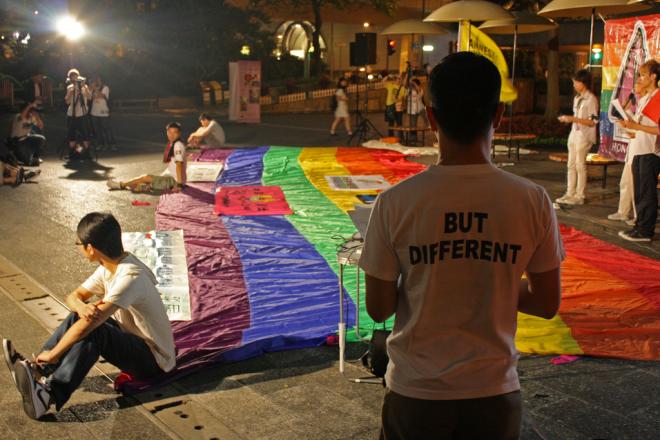>> Homophobia Linked To Psychological Traits, Suggesting It Could Indicate Mental Health Disorders
[spacer]
« Ce n’est pas l’homosexualité le problème, ce sont les homophobes. Ils sont malades mais souffrent sans le savoir : tendances psychotiques et mécanismes de défense immatures », en rapport donc avec des conflits internes non résolus, qui suggèrent une approche inadaptée et problématique à des situations sociales inconfortables.
Ce sont les résultats d’une enquête menée auprès de 560 étudiants, âgés de 18 à 30 ans, par des chercheurs de l’’université de Rome « Tor Vergata », reconnue pour son excellence dans l’enseignement et pour la qualité de ses professeurs.
Après une évaluation de leurs profils psychologiques, les participants ont été confrontés à diverses expériences et interrogés par questionnaires pour établir leur « degré de tolérance aux LGBT », mécanismes de défense et méthodes d’adaptation… révélateurs du fonctionnement psychique. Et, si l’homophobie semble plus susceptible de se manifester chez les hommes, c’est « un facteur prédictif de troubles potentiellement graves comme la schizophrénie ».
Ainsi, tandis que les personnes anxieuses, aux « mécanismes de défense névrotiques », auraient tendance à s’en vouloir, évoluer vers une dépression et se faire du mal… les homophobes déportent leur « déplaisantes pulsions » sur les autres et sont hostiles pour « se défendre » d’eux-même.
« Après avoir débattu pendant des générations sur le fait de savoir si l’homosexualité pouvait être considérée comme une maladie, nous démontrons pour la première fois que ce sont les personnes atteintes d’homophobie qu’il faut soigner », a déclaré l’auteur principal de l’étude, le Docteur Emmanuele A. Jannini, par ailleurs président de la société d’andrologie et de médecine sexuelle. Avec son équipe, il espère contribuer à une meilleure compréhension de la discrimination liée à l’orientation sexuelle et mettre en place des protocoles et suivis, pour prévenir les risques et préjudices.
Terrence Katchadourian
@stop_homophobie
[spacer]
>> Homophobia, or the irrational intolerance of homosexual men and women by heterosexual people has often been interpreted as a vehicle of prejudice and hate, but a recentstudy finds it could also be attributed to psychological problems.
Publishing their findings in the Journal of Sexual Medicine, researchers discovered that certain psychological traits, along with maladaptive defense mechanisms, could potentially feed into homophobic attitudes.
Often, when we encounter people and form relationships with them in any regard, our psychological responses to that person operate on a spectrum of negative and positive emotions. For example, wondering whether we trust this person or not, or if we feel secure or anxious around them, are ways we judge a relationship. If these emotions gravitate toward the more negative sides of the spectrum, and produce anxiety, we tend to conflate these relationships with defense mechanisms in order to feel more secure within the situation.
The researchers, acting under Dr. Emmanuele A. Jannini, president of the Italian Society of Andrology and Sexual Medicine, used these theories to uncover how defense mechanisms play a role in homophobia, as well as how certain psychological disorders could be associated with this form of discrimination.
To test their theory, the researchers recruited 560 Italian University students between the ages of 18 and 30, and evaluated their mental health status according to the Diagnostic and Statistical Manual of Mental Disorders (DSM-5). Once this was done, the students were given three questionnaires: one deciphered degrees of homophobia, the second pertained to defense mechanisms and coping methods, and the third assessed psychopathological symptoms. For the second questionnaire regarding defense mechanisms, the researchers evaluated whether participants displayed mature defense mechanisms when put in uncomfortable situations, like humor or suppression; neurotic defense mechanisms, like idealization; and immature defense mechanisms like projection, acting out, or isolation.
After evaluating participants’ scores, the team first discovered that homophobia was more likely to be reported in men than women. They also found that those who displayed homophobia were more likely to utilize immature defense mechanisms, suggesting a maladaptive and problematic approach to uncomfortable social situations. Finally, and most importantly, researchers found evidence for psychological traits within homophobic individuals; these people were more likely to display psychoticism, which, in extreme cases, could be a predictor of psychotic disorders like schizophrenia, as well as personality disorders. In minor forms, psychoticism manifests as states of hostility and anger.
On the other hand, participants who showed more neurotic forms of defense mechanisms, along with depression, were less likely to display homophobic traits. Jannini believes this is just another way to confirm that homosexuality is not the problem, but rather those who find issue with it are. « After discussing for centuries if homosexuality is to be considered a disease, for the first time we demonstrated that the real disease to be cured is homophobia, associated with potentially severe psychopathologies, » he said.
Jannini and his team hope to add another level of understanding to discrimination pertaining to sexuality, and how interventions can utilize psychological avenues to help prevent prejudice in the future.
Source: Ciocca G, Jannini E, Lenzi A, et al. Psychoticism, Immature Defense Mechanisms and a Fearful Attachment Style are Associated with Higher Homophobic Attitude. Journal of Sexual Medicine. 2015.


















